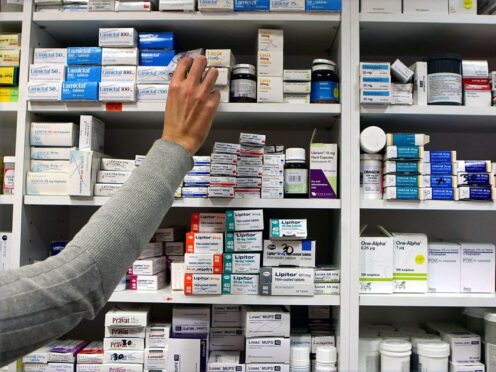Patients are being forced to play “pharmacy bingo” – travelling from shop to shop to find their treatments – amid a rise in medicine supply shortages, experts have warned.
Health leaders said that some patients are even being forced to “ration” their medicines because of supply problems.
It comes as a new poll revealed that medicine shortages are becoming a “daily occurrence” in pharmacies across England.
Treatments for diabetes, ADHD and epilepsy are just some of the medicines that have been in short supply so far this year, Community Pharmacy England said.
As well as “wreaking havoc” on patients, the new survey from Community Pharmacy England has revealed the toll on pharmacy teams across England.
Among those suffering from medicine shortages is Searleana Flesher, from Burgess Hill in West Sussex, who said she feels “sick to my stomach” taking alternative tablets, instead of an injection, to treat her diabetes.
The 50-year-old used to have one injection a day, along with other tablets, to treat her type 2 diabetes but, because of the shortage, had to replace the injection with Rybelsus tablets which she said leaves her feeling sick and losing her appetite.
Ms Flesher, who was diagnosed with type 2 diabetes 20 years ago, currently takes four metaformin pills and one Rybelsus tablet a day but said the latter medicine makes her feel nauseous and dizzy.
She told the PA news agency: “The Rybelsus tablets I’m taking, I’ve lost my appetite and when I take them I feel sick to my stomach because I can’t eat for half an hour afterwards.
“I can’t even have a drink of water for half an hour. I can’t eat or drink before or after it.
“It also makes me feel sick because of the taste of it. I feel nausea and I feel dizzy.”
She has accused celebrities taking similar medicines to treat people with diabetes, such as Ozempic, for misleading the public and causing shortages of vital medicine.
“I think it’s annoying that famous people, who can afford to get a nutritionist and a gym, use (the medicine) as a quick fix,” she explained.
“They use it for vanity but I have to have it for necessity.”
Experts have called for a review of the medicine supply chain.
Findings of the survey of 6,100 pharmacy premises in England and 2,000 pharmacy team members in England, include:
– Nearly all (97%) of pharmacy team members said that their patients are being inconvenienced as a result of medicine supply issues while 79% said patient health is being put at risk as a result.
– 98% said they had issued more “owings” or “I owe yous” to patients as they are only able to supply part of their prescription.
– 99% said they are suffering supply issues at least weekly, while 72% said they were facing “multiple issues a day”.
– Meanwhile, 94% of pharmacy owners said that their teams now spend more time sourcing medicines compared with last year – with almost three quarters of pharmacy staff saying they spend one to two hours every day trying to obtain medicine stock or alternatives.
“The medicine supply challenges being faced by community pharmacies and their patients are beyond critical,” said Community Pharmacy England chief executive Janet Morrison.
“Patients with a wide range of clinical and therapeutic needs are being affected on a daily basis and this is going far beyond inconvenience, leading to frustration, anxiety and affecting their health.
“For some patients, not having access to the medicines they need could lead to very serious consequences, even leaving them needing to visit A&E.
“For pharmacies, ensuring everyone can access the medicines they need has become an ongoing battle, putting immense pressures on pharmacy teams and businesses.
“We’ve been warning for some time that these issues must be resolved, and this evidence provides yet another stark warning which must not be ignored.
Commenting on the poll, William Pett, from Healthwatch England, said: “Medicines supply is an ongoing issue that continues to wreak havoc on patients.
“Healthwatch England hears about how shortages can lead to rationing and desperate instances of ‘pharmacy bingo’, where patients must travel from pharmacy to pharmacy looking for stock.
“We are calling for a review of the medicine supply chain to ensure safety and resilience, and for pharmacy teams to be given flexibility, where it is safe to do so, to make changes to medicines they dispense in collaboration with patients.”
Mark Dayan, from the Nuffield Trust think tank, added: “Nearly every available indicator shows that since 2021 we have experienced a once unthinkable level of medicine shortages again and again.
“The crisis jumps between products and conditions with no sign of showing down. This important survey demonstrates the impact on pharmacists and patients more clearly than anything we have seen before.”
Paul Rees, chief executive of the National Pharmacy Association, added: “This stark survey highlights the precarious nature of the UK’s medicine supply – even for life-threatening conditions.
“Pharmacists will always help patients get alternative medication when possible, but they face continual struggles obtaining supply across an ever-changing range of conditions, from diabetes to ADHD and epilepsy.
“We urgently need the Government to sort out the UK’s fragile medicines supply system, so that pharmacies can do their job and patients can get their lifesaving medicines in time.”
A Department of Health and Social Care spokesperson said: “Supply issues can arise for a wide range of reasons and are not specific to the UK.
“Our priority is to mitigate risks posed by those issues and to help ensure that patients continue to get the treatments they need.
“Thankfully, most issues can be managed with minimal impact to patients.”
